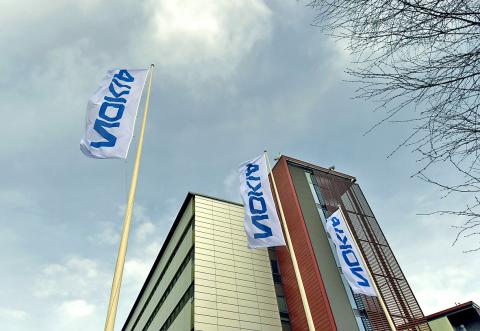FIH Mobile Ltd (富智康) — a subsidiary of Foxconn Technology Group (富士康) — yesterday announced that it has partnered with Finnish company HMD Global Oy to purchase smartphone assets under the Nokia brand from Microsoft Corp for US$350 million.
Under the agreement with Microsoft smartphone subsidiary Nokia Technologies Ltd, FIH is to pay US$330 million and HMD is to pay US$20 million for the assets, FIH said in a filing with Hong Kong Exchanges and Clearing Ltd.
The announcement came two days after FIH reported a net loss of US$3.84 million in the first quarter, down significantly from a net income of US$65.28 million recorded over the same period last year, due to the sluggish smartphone sales of its major clients.

Photo: AFP
As part of the agreement, FIH said its subsidiary TNS Ltd, Nokia Technologies and HMD have also agreed to work together to expand Nokia’s global mobile phone and tablet sales.
FIH said it would support TNS and HMD with sufficient resources to boost sales of Nokia products.
HMD is to be in charge of selling feature phones, while FIH is to manufacture the product and help expand the business to emerging markets through its logistics and distribution networks, FIH said.
Microsoft also released a statement, saying that as part of the deal, FIH would also acquire Microsoft Mobile Vietnam — the company’s handset manufacturing facility in Hanoi, Vietnam.
About 4,500 employees are to transfer or join FIH or HMD in compliance with local regulations, Microsoft said.
The US company said it would transfer all of its feature phone assets, including brands, software and services, care network and other assets to the two companies.
FIH and HMD is also to manage customer contracts and critical supply agreements, Microsoft said.
The companies are expected to complete the transaction in the second half of this year, subject to regulatory approvals and other closing conditions.
Although the US company is to sell its feature phone assets to FIH and HMD, Microsoft said it would continue to develop Windows 10 mobile devices and support Lumia smartphones, such as Lumia 650, Lumia 950 and Lumia 950 XL.
Microsoft is also to continue to work with original equipment manufacturers, such as Acer Inc (宏碁) and HP Inc for smartphone products, it said.

Taiwan Semiconductor Manufacturing Co (TSMC, 台積電) secured a record 70.2 percent share of the global foundry business in the second quarter, up from 67.6 percent the previous quarter, and continued widening its lead over second-placed Samsung Electronics Co, TrendForce Corp (集邦科技) said on Monday. TSMC posted US$30.24 billion in sales in the April-to-June period, up 18.5 percent from the previous quarter, driven by major smartphone customers entering their ramp-up cycle and robust demand for artificial intelligence chips, laptops and PCs, which boosted wafer shipments and average selling prices, TrendForce said in a report. Samsung’s sales also grew in the second quarter, up

On Tuesday, US President Donald Trump weighed in on a pressing national issue: The rebranding of a restaurant chain. Last week, Cracker Barrel, a Tennessee company whose nationwide locations lean heavily on a cozy, old-timey aesthetic — “rocking chairs on the porch, a warm fire in the hearth, peg games on the table” — announced it was updating its logo. Uncle Herschel, the man who once appeared next to the letters with a barrel, was gone. It sparked ire on the right, with Donald Trump Jr leading a charge against the rebranding: “WTF is wrong with Cracker Barrel?!” Later, Trump Sr weighed

HEADWINDS: Upfront investment is unavoidable in the merger, but cost savings would materialize over time, TS Financial Holding Co president Welch Lin said TS Financial Holding Co (台新新光金控) said it would take about two years before the benefits of its merger with Shin Kong Financial Holding Co (新光金控) become evident, as the group prioritizes the consolidation of its major subsidiaries. “The group’s priority is to complete the consolidation of different subsidiaries,” Welch Lin (林維俊), president of the nation’s fourth-largest financial conglomerate by assets, told reporters during its first earnings briefing since the merger took effect on July 24. The asset management units are scheduled to merge in November, followed by life insurance in January next year and securities operations in April, Lin said. Banking integration,

LOOPHOLES: The move is to end a break that was aiding foreign producers without any similar benefit for US manufacturers, the US Department of Commerce said US President Donald Trump’s administration would make it harder for Samsung Electronics Co and SK Hynix Inc to ship critical equipment to their chipmaking operations in China, dealing a potential blow to the companies’ production in the world’s largest semiconductor market. The US Department of Commerce in a notice published on Friday said that it was revoking waivers for Samsung and SK Hynix to use US technologies in their Chinese operations. The companies had been operating in China under regulations that allow them to import chipmaking equipment without applying for a new license each time. The move would revise what is known